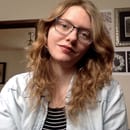Identity is something that shapes us all, whether we identify as female or male, queer or straight. Identity is how we connect with others and how we define ourselves in relation to others. A label can either distance you from or bring you closer to others, and ultimately shapes where you and others believe you belong. Having words, having a language with which to define ourselves is glorified by society as a way to connect with others, but it is also used to cement our differences.
Even when labels are used as ways to create connections between others they also emphasize our differences from others. In some cases, this may give someone who already feels different the opportunity to own their differences and find others like themselves. In others who don’t belong fully to either community, it can have the opposite effect. Sometimes a lack of language or definitive identity as a child can make it harder to feel like we belong anywhere, and having a defining label is a way for us to define ourselves and find a place within a community. For others, however, identity can create tension both outside of the queer community and within it, and emphasize our differences more. The problem with language is that it is defined through binaries. We create identity and language based on what we are not. If we are straight it is defined by what we consider gay; if we are gay, it is determined by what we consider straight. But sexuality and identity is a spectrum, and those who don’t fit either identity are often left unacknowledged by both communities.
In the media, queer people are represented mainly as the cisgender Gay-best-friend, but where is the representation for aromantic, asexual, transgender, bisexual people, and onward, often even within the queer community itself? The term “asexual” was only recently removed from the DSM as a mental health issue in 2013. It is still looked at as a mental health issue by professionals unless clients self-identify, and it is still often unaccepted by heterosexual and queer communities alike. Having language, having ways to define who we are only works if there is a community that accepts that identity. Today a queer person is much more likely to be accepted both within the queer community and outside of it, but that doesn’t change the divisions felt between heterosexual and queer people, or even the divisions between different identities within the queer community. If I am trans, if I am asexual, if I am bi, or pansexual, will I be accepted? The answer remains maybe, but probably not by the entire community. I can find others who I can relate to, others who will stand by me, but for a community that is still trying to achieve equality, we are incredibly divided.
If our gender and sexuality is truly a spectrum, then how do we even begin to justify all these labels? I can honestly say that I don’t know where I fall within the spectrum. And if I do try to label myself, the closest I can get is asexual homoromantic. But even that is often taken into question over whether my identity is only based on trauma or a lack of sexual attraction due to anorexia. And the honest answer is, I don’t know. It could be. But why does it matter? The idea of creating language to define ourselves with is great, to an extent. It provides us with the power to create, and recreate ourselves as we move through our lives. Sexuality is fluid, and as someone learns more about themselves it is possible they will also learn more about their sexuality. So if having these definitions helps, then great, but they don’t work for everyone, and the expectations to fulfil an identity, any identity, are too prominent when there is no way for language to truly represent anyone. Ultimately, we should stand by each other no matter our identities or lack thereof.


